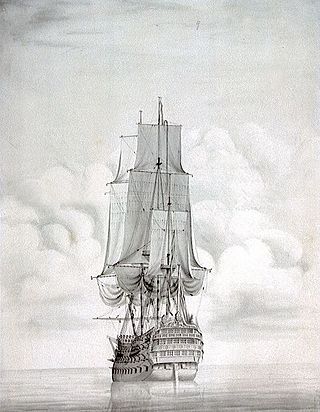
HMS Vanguard was a 90-gun second-rate ship of the line of the Royal Navy, built at Portsmouth Dockyard and launched in 1678.
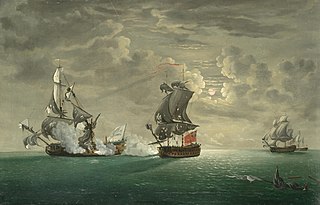
HMS Monmouth was a 66-gun third-rate ship of the line of the Royal Navy, and was likely named for James, Duke of Monmouth. She served from 1667 to 1767, winning ten battle honours over a century of active service. She was rebuilt a total of three times during her career—each time effectively becoming a completely new ship.

HMS Duke was a 90-gun second-rate ship of the line of the Royal Navy, launched on 13 June 1682 at Woolwich Dockyard.

HMS Royal Sovereign was a 100-gun first rate ship of the line of the Royal Navy, built at Woolwich Dockyard and launched in July 1701. She had been built using some of the salvageable timbers from the previous Royal Sovereign, which had been destroyed by fire in 1697.

HMS Warspite was a 70-gun third-rate ship of the line of the Royal Navy, launched in 1666 at Blackwall Yard. This second Warspite was one of the five ships designed to carry more provisions and lower deck guns higher above the water than French and Dutch equivalents. In 1665 the Second Anglo-Dutch War had begun and on 25 July 1666 Warspite was one of 23 new English warships helping to beat a Dutch fleet off North Foreland, Kent. She won again distinction on Christmas Day 1666 as senior officer's ship out of five sent to protect an important convoy of naval stores from the Baltic. Warspite next took part in the first action of the Third Anglo-Dutch War on 28 May 1672 off Southwold Bay, Suffolk. This desperate 14-hour battle, generally known as Solebay, was a drawn fight; but Warspite successfully fended off a pair of Dutch fire ships exactly as she had done off North Foreland. By 1685, she was mounting only 68 guns.
HMS Greenwich was a 54-gun fourth-rate ship of the line of the Royal Navy, built by Christopher Pett at Woolwich Dockyard and launched in 1666.

HMS Falkland was a 50-gun fourth-rate ship of the line of the Royal Navy, built by Holland of New Castle, New Hampshire, and purchased by the navy in 1696.
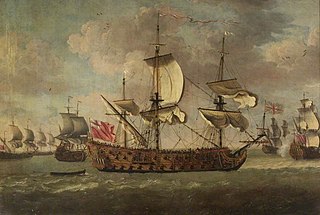
HMS Swiftsure was a 70-gun third-rate ship of the line of the Royal Navy, built by Sir Anthony Deane at Harwich, and launched in 1673. By 1685 she had been reduced to a 66-gun ship.
The English ship Speaker was a 50-gun third-rate. Speaker was built for the navy of the Commonwealth of England by Christopher Pett at Woolwich Dockyard and launched in 1650. At the Restoration she was renamed HMS Mary. She was the prototype of the Speaker-class.

President was a 38-gun fourth rate frigate of the Royal Navy, originally built for the navy of the Commonwealth of England by Peter Pett I at Deptford Dockyard, and launched in 1650.
HMS Albemarle was a 90-gun second rate ship of the line of the Royal Navy, launched on 29 October 1680 at Harwich.
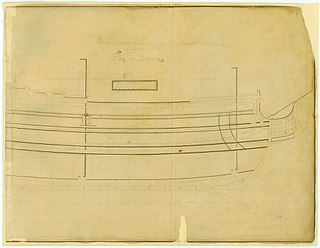
HMS Ossory was a 90-gun second rate ship of the line of the Royal Navy, launched on 24 August 1682 at Portsmouth Dockyard. She was renamed HMS Prince in 1705.
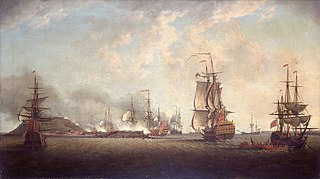
HMS Neptune was a 90-gun second-rate ship of the line of the Royal Navy. She was built under the 1677 "Thirty Great Ships" Programme and launched in 1683 at Deptford Dockyard.

HMS Boyne was an 80-gun third-rate ship of the line of the Royal Navy, launched at Deptford Dockyard on 21 May 1692.

HMS Humber was an 80-gun third rate ship of the line of the Royal Navy, launched at Hull on 30 March 1693.

HMS Newark was an 80-gun third rate ship of the line of the Royal Navy, launched at Hull on 3 June 1695.

HMS Canterbury was a 60-gun fourth-rate ship of the line of the Royal Navy, launched at Deptford on 18 December 1693.

HMS Hampton Court was a 70-gun third-rate ship of the line of the Royal Navy, built at Rotherhithe according to the 1706 Establishment and launched on 19 August 1709.

HMS Plymouth was a 60-gun fourth rate ship of the line of the Royal Navy, built at Devonport Dockyard to the 1706 Establishment of dimensions, and launched on 25 May 1708.
HMS Sunderland was a 60-gun fourth rate ship of the line of the Royal Navy, built to the 1719 Establishment at Chatham Dockyard, and launched on 30 April 1724.
















